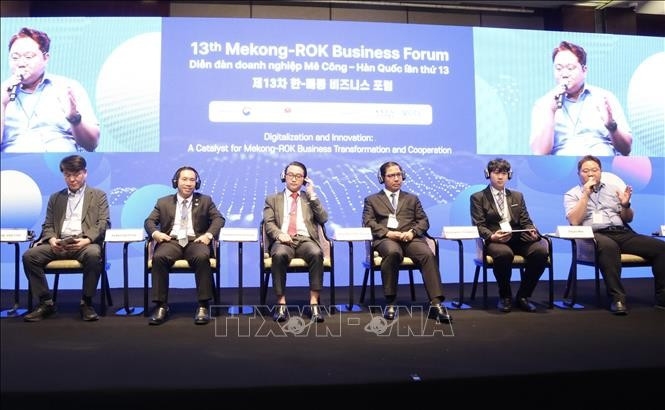Organized jointly by the Vietnamese and RoK Ministries of Foreign Affairs, the two-day forum provided a platform to seek solutions for strengthening collaboration, overcoming economic challenges, and expanding opportunities for sustainable development in a volatile global environment.
    |
 |
|
Delegates at the 13th Mekong – RoK Business Forum |
Over its 12 previous editions, the forum has served as an effective mechanism to promote economic cooperation, build networks, and facilitate investment and trade across the Mekong region and with the RoK.
This year’s theme, “Digitization and Innovation: A Catalyst for Mekong - RoK Business Transformation and Cooperation,” was regarded as both timely and strategic in view of global supply chain restructuring and rapid advances in the Fourth Industrial Revolution.
Vo Tan Thanh, Vice Chairman of the Vietnam Chamber of Commerce and Industry (VCCI), emphasized that Mekong economies face the urgent task of enhancing competitiveness, diversifying supply chains, and accelerating digital transformation. The RoK, with its strengths in information technology, smart logistics, e-commerce, and innovation, was seen as a strategic partner in this effort. Small and medium-sized enterprises, including start-ups, were identified as a central force in bringing policy orientations into practice.
Tran Thi Dieu Thuy, Vice Chairwoman of the Ho Chi Minh City People’s Committee, said the forum’s results in strengthening public–private dialogue, trade promotion, and investment facilitation pushed Mekong – RoK trade turnover beyond 103 billion USD in 2024. They stressed that innovation, artificial intelligence, digital technologies, and smart supply chains are no longer optional but essential for enterprises to integrate into regional and global markets.
The forum's theme aligns not only with each country’s development priorities but also with the formulation of the Mekong – RoK Action Plan for 2026–2030, she said.
Public–private partnerships were encouraged to support SMEs and start-ups in capturing opportunities created by digital transformation, the official added.
The Korea Trade Network (KTNET) shared its experience in operating the uTradeHub digital platform, which processes some 700 million transactions annually and has significantly reduced costs and processing times for RoK businesses. The platform also streamlines certification procedures and supports SMEs in maximizing benefits from free trade agreements.
Logistics was highlighted as another key area of cooperation. Dr. Bui Ba Nghiem from the Agency of Foreign Trade under the Ministry of Industry and Trade, noted that progress in smart customs, digital ports, and ASEAN single-window mechanisms has positioned Vietnam as an emerging logistics hub.
Challenges remain, however, including fragmented legal systems, inconsistent data standards, high costs, weak cold-chain infrastructure, and shortages of digital-skilled labor. To address these, participants called for closer coordination between the State, businesses, research institutions, and international partners to develop a smart, green, and sustainable logistics ecosystem.
Source: VNA